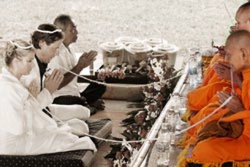Difference between revisions of "Buddhist view of marriage"
| (One intermediate revision by the same user not shown) | |||
| Line 1: | Line 1: | ||
[[File:Thaing.jpg|thumb|250px|]] | [[File:Thaing.jpg|thumb|250px|]] | ||
| + | |||
| + | |||
| + | |||
| + | |||
| + | |||
| + | |||
| + | |||
| + | |||
<poem> | <poem> | ||
| − | The [[Buddhist]] [[view]] of [[marriage]] considers [[marriage]] a secular affair and as such, it is not considered a sacrament. [[Buddhists]] are expected to follow the civil laws regarding [[marriage]] laid out by their respective governments. | + | The [[Buddhist]] [[view]] of [[marriage]] considers [[marriage]] a {{Wiki|secular}} affair and as such, it is not considered a sacrament. [[Buddhists]] are expected to follow the civil laws regarding [[marriage]] laid out by their respective governments. |
[[File:2;03.jpg|thumb|250px|]] | [[File:2;03.jpg|thumb|250px|]] | ||
While the {{Wiki|ceremony}} itself is civil, many [[Buddhists]] obtain the [[blessing]] from [[monks]] at the local [[temple]] after the [[marriage]] is completed. | While the {{Wiki|ceremony}} itself is civil, many [[Buddhists]] obtain the [[blessing]] from [[monks]] at the local [[temple]] after the [[marriage]] is completed. | ||
| Line 13: | Line 21: | ||
[[Gautama Buddha]] never spoke against [[marriage]] but instead pointed out some of the difficulties of [[marriage]]. He is quoted in the [[Parabhava Sutta]] as saying | [[Gautama Buddha]] never spoke against [[marriage]] but instead pointed out some of the difficulties of [[marriage]]. He is quoted in the [[Parabhava Sutta]] as saying | ||
| − | Not to be contented with one's own wife, and to be seen with harlots and the wives of others -- this is a [[cause]] of one's downfall. {{Wiki|Being}} past one's youth, to take a young wife and to be unable to [[sleep]] for [[jealousy]] of her -- this is a [[cause]] of one's downfall. | + | Not to be contented with one's [[own]] wife, and to be seen with harlots and the wives of others -- this is a [[cause]] of one's downfall. {{Wiki|Being}} {{Wiki|past}} one's youth, to take a young wife and to be unable to [[sleep]] for [[jealousy]] of her -- this is a [[cause]] of one's downfall. |
| − | The fundamental code of [[Buddhist]] [[ethics]], the [[Pancasila]] (or [[five precepts]]), contains an admonishment of {{Wiki|sexual}} misconduct, though what constitutes such misconduct from a [[Buddhist]] {{Wiki|perspective}} varies widely depending on the local {{Wiki|culture}}. | + | The fundamental code of [[Buddhist]] [[ethics]], the [[Pancasila]] (or [[five precepts]]), contains an admonishment of {{Wiki|sexual}} {{Wiki|misconduct}}, though what constitutes such {{Wiki|misconduct}} from a [[Buddhist]] {{Wiki|perspective}} varies widely depending on the local {{Wiki|culture}}. |
The [[Digha Nikaya]] 31 ([[Sigalovada Sutta]]) describes the [[respect]] that one is expected to give to one's spouse. | The [[Digha Nikaya]] 31 ([[Sigalovada Sutta]]) describes the [[respect]] that one is expected to give to one's spouse. | ||
Latest revision as of 13:05, 28 March 2024
The Buddhist view of marriage considers marriage a secular affair and as such, it is not considered a sacrament. Buddhists are expected to follow the civil laws regarding marriage laid out by their respective governments.
While the ceremony itself is civil, many Buddhists obtain the blessing from monks at the local temple after the marriage is completed.
The Dalai Lama has spoken of the merits of marriage.
Too many people in the West have given up on marriage. They don't understand that it is about developing a mutual admiration of someone, a deep respect and trust and awareness of another human's needs...The new easy-come, easy-go relationships give us more freedom -- but less contentment.
While Buddhism neither encourages nor discourages marriage, it does offer some guidelines for it. While Buddhist practice varies considerably among its various schools, marriage is one of the few concepts specifically mentioned in the context of Śīla (Buddhist behavior discipline).
Gautama Buddha never spoke against marriage but instead pointed out some of the difficulties of marriage. He is quoted in the Parabhava Sutta as saying
Not to be contented with one's own wife, and to be seen with harlots and the wives of others -- this is a cause of one's downfall. Being past one's youth, to take a young wife and to be unable to sleep for jealousy of her -- this is a cause of one's downfall.
The fundamental code of Buddhist ethics, the Pancasila (or five precepts), contains an admonishment of sexual misconduct, though what constitutes such misconduct from a Buddhist perspective varies widely depending on the local culture.
The Digha Nikaya 31 (Sigalovada Sutta) describes the respect that one is expected to give to one's spouse.

